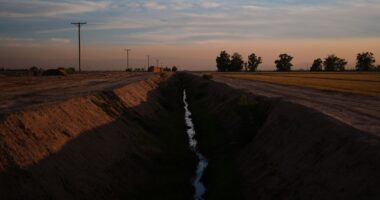Share this @internewscast.com
The Trump administration is reportedly set to dismantle a major research facility, which currently hosts the nation’s most significant federal climate change program. This move comes amid claims by top officials that the program has been a key source of “climate alarmism.”
White House budget director Russell Vought, a co-author of Project 2025 who once declared his intention to traumatize federal workers and quash environmental regulations, announced the plan late Tuesday.

An announcement on social media platform X revealed that the National Science Foundation plans to break up the National Center for Atmospheric Research (NCAR) based in Boulder, Colorado. The facility, as reported by USA Today, is said to be a leading contributor to climate change warnings in the United States. Officials stated that a thorough evaluation is in progress, and essential work, like weather research, will be relocated to other locations.
Experts in the scientific community argue that extracting climate study from NCAR’s broader mission, which involves analyzing the Earth’s atmosphere and its influences, presents significant challenges. They warn that the implications of this decision will affect much more than just climate change research.
“This is astonishing. The impact on American science would be profound,” commented Daniel Swain, a climate scientist from UCLA, on X. “It would not only cripple climate research but also undermine decades of advancements in weather forecasting, wildfire studies, and disaster preparedness. NCAR has been pivotal in enhancing weather prediction and atmospheric modeling globally.”
Beyond climate change, the research lab is integral to efforts that forecast, prepare for, and respond to extreme weather and natural disasters. UCAR President Antonio Busalacchi emphasized in a statement that the lab is one of the world’s foremost institutions in this field. The facility is managed by a nonprofit consortium of over 130 universities and colleges under the U.S. National Science Foundation’s guidance.
The National Science Foundation has described the planned changes as a “realignment,” aimed at maintaining the nation’s leadership in science, engineering, and technology. They suggest these structural updates will boost efficiency and effectiveness within the organization.
Scientists, Boulder officials, business leaders and educators said the move would do anything but.
It would be complete folly to eliminate an institution that is “quite literally our global mothership,” Katharine Hayhoe, a climate scientist and Distinguished Professor at Texas Tech University, wrote on X, adding: “dismantling NCAR is like taking a sledgehammer to the keystone holding up our scientific understanding of the planet.”
Climate change’s footprint is evident in all the systems studied, which affects daily life in myriad ways, from national security to the economy, experts said.
“Climate change is real, but the work of NCAR goes far beyond climate science,” Colorado Gov. Jared Polis said in a statement. “NCAR delivers data around severe weather events like fires and floods that help our country save lives and property, and prevent devastation for families.”
With News Wire Services
















